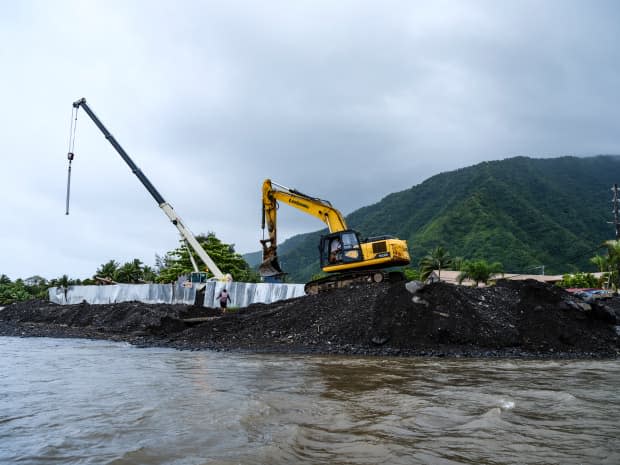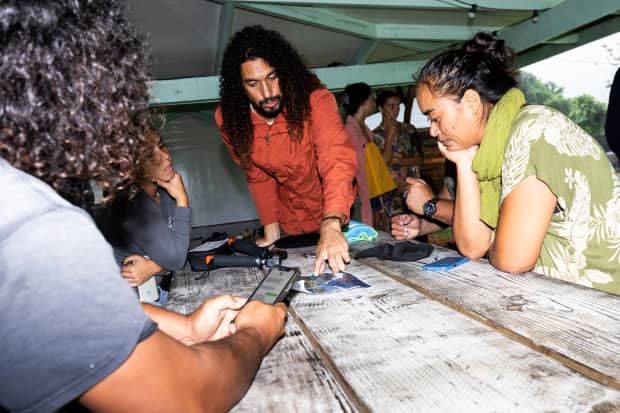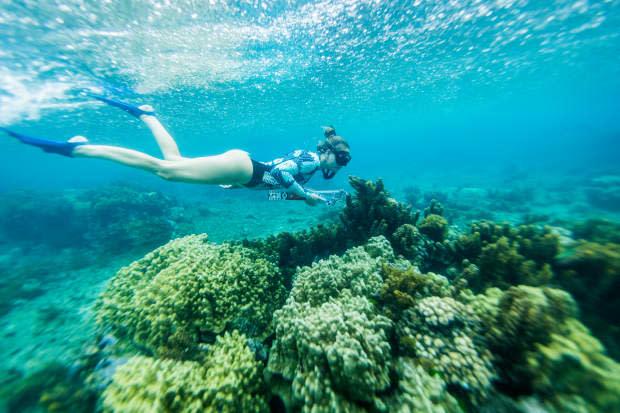Chemist/Pro Surfer Cliff Kapono and a Team of Scientists Advise Against Olympic Judging Tower at Teahupo'o
Over the past few years, chemist, assistant professor and oh-so-stylish professional surfer Cliff Kapono has been traveling to different waves around the world to map out coral reefs at some of the best waves in the world. With his team at the Mega Lab–a crew of scientists that studies coral reef ecology and how coastal communities are affected by climate change–Kapono recently traveled to Tahiti to collect data at Teahupo'o–the world-famous barrel machine set to host the surfing portion of the Paris 2024 Olympic Games.
Tahiti's been on Kapono's research radar for years, but when the community of Tahiti started protesting the IOC's new proposed judging tower set to be constructed on the reef at Teahupo'o, Kapono saw the need to help the locals with data ASAP.
Just a couple weeks ago, Kapono and his team sent out a press release of what they found–both in terms of what's living on the proposed construction site and the monetary value that could be lost if the construction continues. We rang up Kapono last week to get a little more insight into his preliminary findings:
So, first tell me a little bit about what you and the Mega Lab guys found from your research in Tahiti.
We went down and found that in the area where the current footings are, which is the potential site of the new judging tower, we found over 1,000 live corals (and over 24 different species) that exist. The area we surveyed is about the size of a tennis court. From there, we did some estimates based on the entire lagoon. In Hawaii there’s a valuation system that has been set up by the Department of Aquatic Resources and the Department of Land Natural Resources that applies values to certain species of coral reefs, depending on their size and the way they grow. So, we applied this value system to the different corals that exist in Tahiti at the tower site and we got a value—including the algae and the coral exist that there–of about $170,000 (USD) worth of living organisms that exist at the proposed site.
Then when we did an estimate of what total potential damage that could happen, and we calculated about 1.3 million dollars worth of damage. And that’s a very conservative estimate. That’s not even counting the potential value of the wave or the contest. We just wanted to give some sort of economic value to the proposed impact that it could have.

Todd Glaser/Mega Lab
What we were trying to do was not say, 'it’s going to destroy the reef or it’s going to kill xyz,' we just wanted to have a baseline survey of what exists and what’s there. It's important to understand what you have before it’s lost so you can make arguments.
What did you guys recommend as scientists?
From a scientific perspective, what we actually went down there to do was to map the wave. And when we went down to Tahiti, we realized that the community was really upset and worried about the potential impact of this tower that’s going to be built. The constant messaging out on social media is 'use the old WSL tower, it has low impact, it supports the community, it’s temporary.' The only permanent part of that is the footings that exist on the reef that have been there since the late 90s/early 2000s and those have essentially become part of the reef now. We had the tools to survey the reef, take an inventory and establish a value system based on Hawaii standards. I don’t know if it can stop it from going forward but this was something we could do.
We put out a statement and are also publishing a paper based on the data and we expressed that we believe that everyone a part of this needs to consider the impacts of putting permanent change to a live reef. Anytime you put permanent structures in and around the ocean, you’re going to have permanent impact. Permanent structures will lead to permanent impact—what that is we don’t know, but we wanted to show that it at least will be quantifiable through these metrics and empirical data.
Aside from the economic potential, what do you think this construction could mean for the reef or the people who live there?
From a personal standpoint, I believe that no matter what there’s going to be damage to a community of indigenous people. Outside foreign interest shouldn’t have the right to dictate what happens to their reefs. To me, that’s so backwards when the local people are saying 'there is a concern of risk' and the outside interests are 'saying you don’t have to worry.'
Unfortunately, surfing is being used as a weapon to disregard the perspectives of indigenous peoples and when we talk about the biodiversity, the indigenous people, although they make up just a fraction of the global population, they protect the majority of biodiverse spaces on the planet. That’s why there’s a huge movement across the united nations and governments to protect indigenous knowledge and ways of being because they're are very critical to the overall conversation and environmental stewardships practices as deemed worthy by the UN and the new deals that everyone has.
Personally, I feel it’s a bad idea to not listen to the indigenous peoples, in this case the Tahitians of Teahupo'o. It’s gonna be really hard to trust in what surfing is becoming when it feels like surfing is becoming a weapon for environmental degradation.

Todd Glaser/Mega Lab
Yeah it feels like outside interests are just sort of patting locals on the head saying "don't you worry."
It's very much like, 'your concerns aren’t valuable,' but they are the stewards of that wave. The people of Teahupo'o, from what I hear, they want the Olympics to happen, they want to host people, they want to be a part of the world, but the people who are coming are not taking into consideration their concerns about the reef.
If the Olympics is supposed to galvanize the community around camaraderie and love for nationality and connection to a place, and you’re removing people from their place, displacing people from their place, that seems a bit backwards. This idea of needing to perform at all costs, even at the cost of the resource that you depend on to compete, again is a very big problem. This is carving out a very dangerous path in surfing.
This could be easily taken and interpreted that I’m hating on the Olympics, but at the core of why I feel like it’s a bad idea is because I was there, I spoke to the people and I’ve seen the pain that the Olympics and whoever is in charge of building this is causing. And surfing isn’t about that.
In the past, it seems like the Olympics like to tell stories about local athletes and the local environment. They’re going to have a real hard time doing that in 2024 if they're displacing the local people.
Surfers, and the way Tahitians specifically surf that wave, is the reason why the Olympics have interest in that wave. Now they have to be put on guard and play defense. It sucks. At the end of the day, we, as scientists, wanted to assign a valuation of money, so we could say, 'hey, you messing up this little patch of reef could impact you $170,000 USD, and if you affect the perimeter of this lagoon to get there, you’re looking at potentially destroying 1.3 million dollars worth of resources that you have.' In Hawaii, the person who doesn’t even care about coral reef in Hawaii would see the value of $170,000. Just in that tennis court size thing.
Did you submit these finding to the IOC and the French Polynesian government?
Our findings are currently under review by scientists that basically say, 'okay, you did your methods correctly,' and once that comes out we go full force announcing this has been accepted by the scientific community. This process just takes a little time.
We gave the data to the community members at Teahupo'o. We gave it to the ISA, Surfrider, Save the Waves, etc.
I understand that in the grand scheme of things, the 2024 Olympics is here and France is going gangbusters for what they have to do and this is just an afterthought because surfing is such a small component to the Olympics.

Todd Glaser/REEF/Mega Lab
On that note do you think there’s anything the average surfer can do to help the situation?
Yeah, I think everyone has a role. There’s a petition out now and right now they are just trying to get to 300,000 signatures. There are already some incredible surfers on that list—some of the greatest surfers of all time have signed this petition. Your name can be alongside some of the greatest surfers of all time and their beliefs to stand up for what is right. This is an opportunity for the surf community to stand for something together.
In Hawaiian culture, we have the Kūʻē Petitions. When the American government overthrew the kingdom, there was a petition that went around. Now, over 100 years later, if you find your ancestor on there, it makes you feel really proud to know that you are apart of the celebration of what’s right. That’s what I think this petition signifies. When you pass surfing onto future generations, they can look and go 'my great grandpa or grandma' signed this petition when the Olympics threatened the heart of surfing. It’s easy—it’s just clicking and typing your name.
Corporations and sponsors—any brands that are profiting off of surfing–they should create a safe space for the surfers who are engaging in the Olympic Games and the surfers who feel a bit scared to speak out. If the surf industry creates a safe space for athletes and surfers to feel like they can speak up and support, I think that’s going to galvanize the influencers or people who are shifting the culture within the landscape of surf industry to come out and say, 'hey this is what I believe.' Surf media having these conversations and elevating this into the surfing narrative is super important because this is our waves being threatened in real time and if this is not newsworthy, I don’t know what is.
It's everyone’s best interest to speak up for this situation and stand together on it. In terms of the community members in Tahiti and people who are strong supporters of the Olympics, it’s okay to not agree with the tower being built on the reef. Being pro reef doesn’t mean you’re anti-Olympics or anti-surfing. It just means that evidence is being put forward and there’s no need to put a permanent structure on a living ecosystem.
